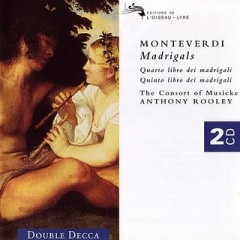Claudio Monteverdi – Madrigals. Books 4 & 5 (1997)
Claudio Monteverdi – Madrigals. Books 4 & 5 (1997)

CD 1
1. Book 4, SV 75-93: 1. Ah dolente partita!
2. Book 4, SV 75-93: 2. Cor mio, mentre vi miro
3. Book 4, SV 75-93: 3. Cor mio, non mori?
4. Book 4, SV 75-93: 4. Sfogava con le stelle
5. Book 4, SV 75-93: 5. Volgea l'anima mia
6. Book 4, SV 75-93: 6. Anima mia perdona. Prima parte
7. Book 4, SV 75-93: 7. Che se tu se'il cor mio. Seconda parte
8. Book 4, SV 75-93: 8. Luci serene e chiare
9. Book 4, SV 75-93: 9. La piaga c'ho nel core
10. Book 4, SV 75-93: 10. Voi pur da me partite
11. Book 4, SV 75-93: 11. A un giro sol de' begl'occhi
12. Book 4, SV 75-93: 12. Ohimè, se tanto amate
13. Book 4, SV 75-93: 13. "Io mi son giovinetta"
14. Book 4, SV 75-93: 14. Quel augellin che canta
15. Book 4, SV 75-93: 15. Non più guerra pietate
16. Book 4, SV 75-93: 16. Sì ch'io vorrei morire
17. Book 4, SV 75-93: 17. Anima dolorosa
18. Book 4, SV 75-93: 18. Anima del cor mio
19. Book 4, SV 75-93: 19. Longe da te cor mio
20. Book 4, SV 75-93: 20. Piagn' e sospira
21. Con che soavità, labbra odorate (from Book 7), SV 139
22. Mentre vaga Angioletta ogn'anima gentil cantando alletta (from Book 8), SV 157
23. Tempro la cetra (from Book 7), SV 117
CD 2
24. Book 5, SV 94-106: 1. Cruda Amarilli
25. Book 5, SV 94-106: 2. O Mirtillo, Mirtill', anima mia
26. Book 5, SV 94-106: 3. Era l'anima mia
27. Book 5, SV 94-106: 4. Ecco, Silvio
28. Book 5, SV 94-106: 5. Ma se con la pietà
29. Book 5, SV 94-106: 6. Dorinda, ah! dirò
30. Book 5, SV 94-106: 7. Ecco, piegando
31. Book 5, SV 94-106: 8. Ferir quel petto
32. Book 5, SV 94-106: 9. Ch'io t'ami
33. Book 5, SV 94-106: 10. Deh! Bella e cara
34. Book 5, SV 94-106: 11. Ma tu, più che mai dura
35. Book 5, SV 94-106: 12. Che dar più vi poss'io
36. Book 5, SV 94-106: 13. M'è più dolce il penar
37. Book 5, SV 94-106: 14. Ahi, come a un vago sol
38. Book 5, SV 94-106: 15. Troppo ben può
39. Book 5, SV 94-106: 16. Amor, se giusto sei
40. Book 5, SV 94-106: 17. "T'amo mia vita!"
41. Book 5, SV 94-106: 18. E così a poc' a poco
42. Book 5, SV 94-106: 19. Questi vaghi concenti
43. Ogni amante è guerrier (from Book 8), SV 151
Emma Kirkby, Poppy Holden, Evelyn Tubb (sopranos)
Cathy Cass, Mary Nichols (altos)
Joseph Cornwell, Paul Elliott, Andrew Lawrence-King (tenors)
Richard Wistreich, John Milne, David Thomas (basses)
The Consort of Musicke - Anthony Rooley (conductor)
This is a very fine presentation of some of the greatest madrigals ever written. Part of a whole series of recordings of the famous Books of Madrigals by Monteverdi, this double CD presents earlier recordings made by a group of distinguished singers led by Emma Kirkby together with Anthony Rooley's Consort of Musicke. One of the seminal groups of the Early Music movement, the Consort is known for its contributions to the performance of Renaissance music through the 1970s, 80s, and 90s.
I found this collection useful for the historical connotations of the program. One of the most important aspects is the birth of the new style in the first years of the seventeenth century. With the last six pieces of the Fifth Book, Monteverdi specifically demands the use of continuo instruments and through this he clearly marks the transition to the Baroque era. The seconda pratica (second practice) characterizes most of these two books of madrigals. The opening of the madrigal "Sfogava con le stelle" (Communing with the stars) represents an ensemble declamation on one chord in the rhythm of the text. In the new style, the words should govern the music, the sonorities must be in accordance with the textual images and ideas. The theatrical style is reinforced in the pieces of the Fifth Book by the particular dissonance treatment, such as unprepared sevenths and ninths. They were characterized at the time as improper.
The importance of the text is also evident through the thinner textures that Monteverdi uses at different moments in a piece. The composer writes passages where only alternating pair voices sing or if there are three voices at a time, one of them has a functional role while the other two move in parallel thirds, as in "Io mi son giovinetta" (I am young). Polyphony is not abandoned (a few madrigals have reminiscences of the prima pratica), but enhanced to smaller groups of voices competing or completing with each other.
The present recording sets apart through the clarity of the voices and the delicate ornamentation of certain passages, including a perceptible vibrato often used to enrich the sonority of such a small group. An impeccable vocal technique, which doesn't show off but serves the communication of emotions, an elegant treatments of the dynamics, including expressive accents, and an impeccable Italian diction are defining elements of this performance. Balance is sometimes a very difficult task in the context of Monteverdi's madrigals, but these singers are well coordinated and prove a highly trained sense of awareness. To give this recording an even more interesting angle, the collection is rounded off by other four substantial accompanied madrigals. "Con che soavità" and "Tempro la cetra" come from the 7th Book, while "Mentre vaga Angioletta" and "Ogni amante è guerrier" are taken from the 8th Book. These pieces give the listeners an idea about the direction of Monteverdi's music. ---Bogdan Minut, amazon.com
download: uploaded yandex 4shared mediafire solidfiles mega filecloudio nornar
Last Updated (Monday, 24 February 2014 12:46)








